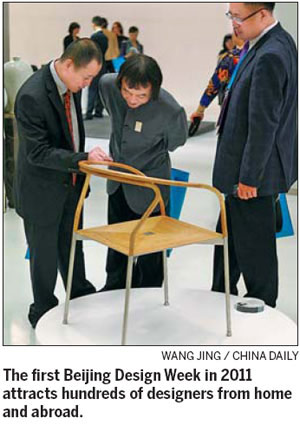Design Week aims to rejuvenate capital's communities

Barely five months after receiving UNESCO's Design Capital title in May, Beijing has gone full speed with the preparations for its upcoming design week, scheduled to coincide with China's National Day celebration.
This year, the emphasis is on further integrating the concept of design into the building and rejuvenating of local communities, with one typical example being the city's hip and historic Dashilar Commercial Street area.
A handful of visual and audio projects will be put in place to "start a conversation between the district's past and present", says Aric Chen, Beijing Design Week's creative director.
"We are not looking at a particular historical moment, but rather, the area's entire trajectory of development as a whole and its future possibilities," he says.
At a recent press conference, the director cited "craft" as a key word but extended its meaning to include a new mode of thinking.
"Craft is inseparable from design, but I don't want to concentrate just on the physical aspect of the word, which constitutes its conventional meaning," he says.
"I intend to introduce the essence of that word, and the attitude behind it, into our broader social sphere. We can craft our city and our society with the same deliberation with which a master craftsman treats a work of art."
Being so closely influenced by the market has made design a particularly vulnerable area of creativity. With the world still trying to walk out of the financial doldrums, the design industry is indirectly affected.
While admitting that a single design week alone cannot change the big picture, Chen Dongliang, the organizing committee's deputy director, says he is still hoping for the best.
"I asked myself whether the biggest progress in design is made in good or bad times, and the answer veers toward the latter. Why? In good times, everyone is busy selling their own stuff, while in bad times, people tend to be more protective of their creations' singularity," he says.
He also commented on several widely-reported originality disputes during the China International Furniture Affair in Guangzhou and said something good came out of them. "Copying becomes intolerable - a good outcome that ultimately benefits the quality of design," he adds.
To broaden the event's international appeal, the organizers have made special efforts to transplant part of the Milan Design Week in China. Exhibitions featuring Italy's most prized 4F - food, fashion, furniture and Ferrari - will be held, offering a rare opportunity to learn from "the big sister" of design.
zhaoxu@chinadaily.com.cn
















